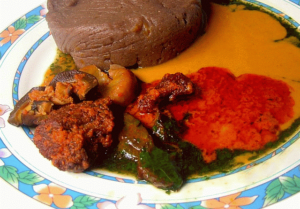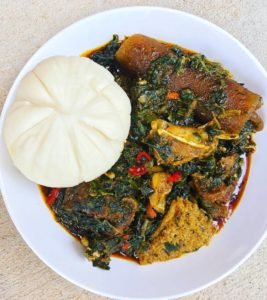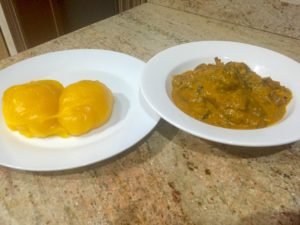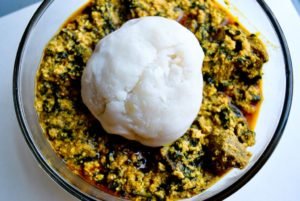“Owambe” is a word used to describe a typical Nigerian party swamp by lots of food and drinks with the traditional ‘aso-ebi’ (uniformed clothing) on display. An invitation to an “Owambe” means different things to different Nigerians. To some, it is an opportunity to reunite with old school mates, family, and friends. Some see it as an opportunity to showcase their latest fashion and artistry make-up. To foodies, “item eight”, a tagline given to tasty and finger-linking cuisine is the real deal. They look out for the local Nigerian delicacies which are not everyday foods in most their homes.
A host who decides to treat his/her guests with some artfully prepared “Owambe” local delicacies is most likely intentional because such aren’t just served for serving purposes. They are as a way of displaying our rich cultural heritage. They also provide a sense of belonging to the guests who quickly feel at home at the sight of these foods. A host dare not omit these five Nigerian local dishes from the party menu else the dance floor gets empty quickly.
Amala and Efo-riro/Gegiri &Ewedu

This is for the south-western region. The “Yorubas” own this meal and are very pleased with it. A Yoruba man may not be himself without having a taste of this at a party. Amala is a semi-solid pastry meal made with yam flour. It goes well with Efo-riro (well spice green vegetable) soup. When this is not available, Gegiri and Ewedu soup, made of beans and slippery vegetable leaves is an alternative. Of course, the tasty portions of beef and chicken are sides to this meal. No matter how highly sophisticated a party is, when Yorubas are invited, Amala and soup are a must-serve local delicacy. And guess what, it is mostly eaten with the five fingers. That is how best to enjoy it.
Afang soup and Fufu

This is for the south-south locals. Afang soup is a must eat for the Efik ethnic group. The slimy-feel soup is both nutritious and medicinal. It is made with Afang leaves/Okazi leaves, water leaves and assorted meat loads. Periwinkles are commonplace in it. It is best eaten with starchy food like Fufu, a cassava flour meal. Another starchy meal that goes with Afang is starch (Yellow cassava meal) and Eba, made from Garri (a cassava product). Afang served at parties literarily send guests back to their roots. A party attended without this is a deprivation for an Efik man.
Starch and Oghwo Soup

The Urhobo tribe owns this. The dish has some cultural significance among the Niger-Delta folks. It’s presence at a party signifies reverence. A host who serves this gets enlisted in the Urhobo guests’ book of life. Oghwo soup ingredients are palm oil, stockfish, meat, pepper, potash, a sprinkle of cassava granules (Garri) and seasoning. The soup blends well with starch, made from cassava product. Serve this and make the Urhobos feel welcome and appreciated.
Tsakwara da Busheshen Kubewa
The Northerners’ pride in their special delicacy called Tsakwara da Busheshen Kubewa. The dish is a deviation from the staple rice meal eaten daily in northerners’ homes. It is made of pounded yam and dried okra soup. Pounded yam is from yam flour. Dried okra soup gives a black-green look, and it is cooked with stock, spices, and seasoning. A Hausa folk would cherish this a lot.
Egusi soup and Fufu

The Igbos in the Eastern part of the country value Egusi soup garnished with stockfish and vegetable (Ugwu) at parties. Give this to an Igbo man and hear him pray for you from his heart. Egusi is from melon. The soup is eaten with fufu (cassava balls). It is of importance to note that Igbo fufu isn’t that semi-solid when compared with the ones made in another tribe. You can literarily stone someone with it. Lol. Yes, that is how hard it can be. To prevent being at loggerhead with the Igbos, serve this delicacy at your “Owambe”.
This is not to rule out other dishes like Jollof and fried rice from a typical Nigerian party. Of course, you have those but, these local Nigerian delicacies are must have. A party host who has all these dishes on the menu can as well go to sleep with the assurance that the guests are adequately catered for.












